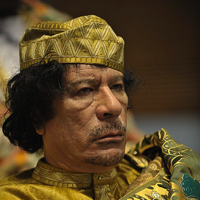Writing in his World Politics Review column this week, Thomas P.M. Barnett warned that the United States' response to the Libyan uprising risks turning Ian Bremmer's and David Gordon's prediction of a "G-zero" world into a self-fulfilling prophecy. Specifically, Barnett argued that by failing to take the lead in organizing an intervention to tip the scales in the Libyan civil war on behalf of the opposition to Moammar Gadhafi, the Obama administration was "purposefully abdicat[ing] its global leadership role."
Another reading is that the administration's reaction to the Libyan uprising reflects the degree to which it allowed itself to be swept up by the "Al-Jazeera effect" into assuming that the authoritarian regimes in North Africa were lined up and ready to fall like dominos, and that Libya's "Brother Leader" would soon follow Egypt's Hosni Mubarak and Tunisia's Zine al-Abidine Ben Ali into involuntary retirement. In so doing, the Obama administration ignored much of Libya's particular context -- including the long history of failed uprisings against Gadhafi ever since he seized power in 1969, the longstanding resentment in Eastern Libya over being ruled by a government in Tripoli and the parallels between what is happening now and the 1993 coup attempt against Gadhafi -- in order to fit the country into the narrative of an "Arab spring." Had the specifics of the Libyan situation been better appreciated, particularly how the 1993 coup attempt began and was crushed, the Obama team might have been more careful in its public reaction to the current uprising.
The administration's first mistake was in announcing a preferred outcome. As Judah Grunstein wrote here at WPR, "If President Barack Obama made one misstep, it was in allowing his rhetoric to get out in front of his willingness to act . . . The words, 'Gadhafi must go,' mean something very different coming from the president of the United States than they do coming from the president of any other country in the world."

